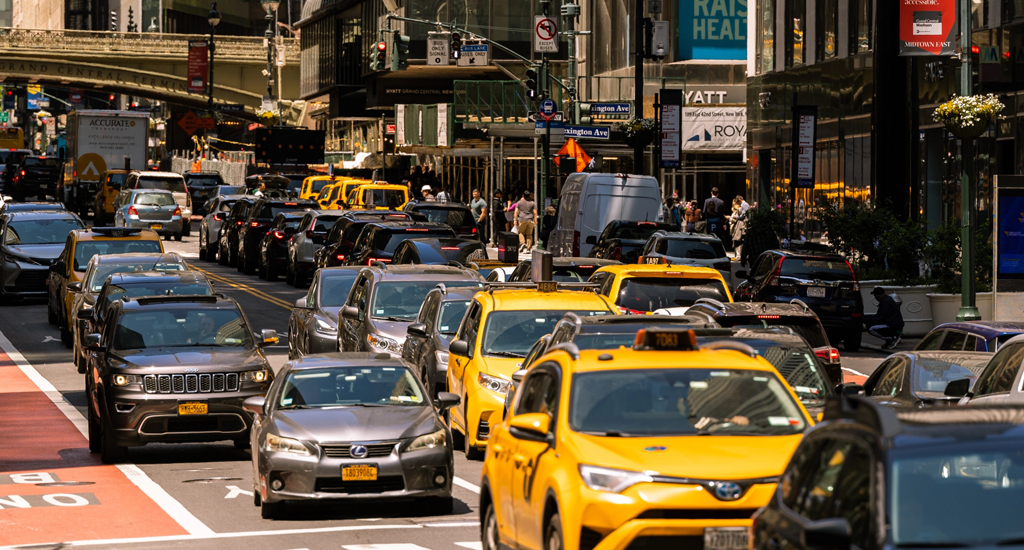Can you discount them? They're electric!
A group of Manhattan elected officials has asked for a discount for electric vehicles when congestion pricing comes to Manhattan in 2024, but advocates suggest it may not be the best way forward.
In a letter to the Traffic Mobility Review Board, the panel tasked with recommending toll prices and exemptions to the MTA, the Manhattan representatives argued that electric cars should catch a break because they "do not contribute significantly to the smog and pollution of the Central Business District."
"While they do cause congestion, and thus should share in the responsibility of any program, their reduced environmental impact should be compensated, given emission reduction is a core tenant of this program’s intent," the pols wrote in the letter, which was dated the day the TMRB met in mid-July. "London’s set of fees similarly has lower rates for electric cars. To the extent possible, this program should incentivize drivers to use greener vehicles," the letter continued.
The group of lawmakers did not say how much the discount should be. Assembly Members Alex Bores, Eddie Gibbs, Deborah Glick, Harvey Epstein, Rebecca Seawright; State Senators Brad Hoylman-Sigal, Liz Krueger, Kristen Gonzalez and Manhattan Borough President Mark Levine all signed the letter.
Bores, who spearheaded the effort among the Manhattan reps, said that the discount proposal doesn't work against congestion pricing's goals because favoring electric vehicles helps with the goal of reducing emissions.
"We have many goals of congestion pricing," he said. "One is congestion. One is the environment. There are other ones as well. And I think it's just recognizing that when it comes to the environmental case, an electric vehicle is just a different profile than than a gas-guzzling one."
However, congestion pricing advocates say that making the distinction between electric cars and gas-powered cars cuts against the goals of congestion pricing.
"There are so many other government incentives now for electric cars we don’t need to muddy the policy’s focus on congestion and transit," said Jon Orcutt, a former city DOT official.
Other advocates said that the comparison to London wasn't a good one, because when The Big Smoke introduced its congestion charge in 2003, driving an electric car actually meant something.
"When London started their program it was at a time when we didn't have as many electric vehicles and incentives for them. Now there are more, and every year, there are more and more options of EVs that didn't exist previously," said New York League of Conservation Voters President Julie Tighe, who pointed out that the state has committed to only sell electric vehicles by 2035.
"I often say, we can't drive our way out of the climate crisis. So everybody switching to EVs is not going to solve all the problems," Tighe said. "We need to, in this case, encourage people to be taking mass transit and using alternative means of transportation."
Even the cities that offered EV discounts on congestion tolls are moving away from them. In Singapore and Gothenburg, the charges never discounted or exempted electric cars, while in Stockholm the exemption for EVs first did not apply to any electric vehicle built after 2012, and then was eliminated entirely.
In London, the EV discount is on its way out the door. In 2018, London Mayor Sadiq Khan and Transport for London announced that it would begin phasing out its 100 percent congestion charge discount for low-emission and electric vehicles, and completely do away with the discount on December 25, 2025. TFL specifically noted that the low-emission exemption had worked possibly too well in encouraging Londoners to buy low-emissions vehicles.
"In May 2018, there were approximately 20,000 vehicles registered for the discount, an increase of 5,500 vehicles from the previous year," TfL wrote. "As at March 2018, around 8 percent or 1,500 of these vehicles enter the [Congestion Charge Zone] on a charging day."
Bores defended the London comparison because the city is expanding the area covered by a separate Ultra Low Emissions Zone charge that electric cars are exempt from, so in his view the city is merely shifting the cost of the congestion charge from the ULEZ toll.
The letter, to the elected officials' credit, is not just a litany of requests for exemptions and discounts, as it also asks the TMRB to not give drivers credits for crossing any bridges and tunnels into Lower Manhattan.
But ultimately, because congestion pricing's primary goal is fighting actual traffic congestion, Tighe said an incentive for electric cars is still an incentive for traffic.
"Ninety-one percent of the vehicles that are making up the congestion in lower Manhattan are personal light duty vehicles, right?" Tighe said. "We want to be reducing traffic. And we cannot reduce traffic if we just converted everybody to EVs."






